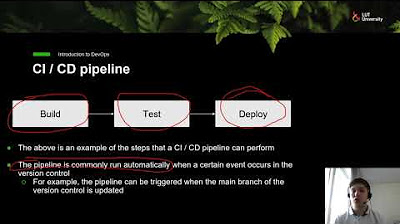CI/CD In 5 Minutes | Is It Worth The Hassle: Crash Course System Design #2
Summary
TLDRCI/CD, or Continuous Integration and Continuous Delivery, is a software development practice that automates the process from code commit to deployment, reducing manual intervention. It promises faster, higher-quality software deployment through automated building, testing, and deploying. CI is widely adopted, ensuring code safety with automated workflows and robust tests. CD, or continuous deployment, is more challenging but can be managed with techniques like feature flags, canary deployments, and monitoring. Tools like Github Actions, Buildkite, Jenkins, and ArgoCD facilitate these processes, though implementation complexity varies. CI/CD is powerful but requires careful balance and tooling to realize its full benefits.
Takeaways
- 🔧 CI/CD stands for Continuous Integration and Continuous Delivery, automating the software development process from code commit to deployment.
- 🚀 CI/CD aims to enable software teams to deploy better-quality software faster by eliminating manual human intervention in the deployment process.
- 🤔 The effectiveness of CI/CD in real life depends on various factors and its implementation may vary.
- 💻 CI (Continuous Integration) involves automating the merging of code changes into a shared repository, ensuring commits are safe to merge into the main branch.
- 📚 A good CI process relies on a set of robust tests, which can be challenging to maintain but is crucial for ensuring code quality.
- 🛠️ Common tools for CI include source code management systems like Github, and CI management tools such as Github Actions, Buildkite, Jenkins, CircleCI, and TravisCI.
- 🧩 Test tools for writing and running tests are language and ecosystem specific, with examples like Jest for JavaScript and playwright for web applications.
- 🏗️ Build tools, such as Gradle for Java and Webpack for JavaScript, are diverse and ecosystem specific, impacting the ease of maintaining a CI process.
- 🌐 CD (Continuous Deployment) is harder to implement fully due to the complexities of real continuous deployment, especially in stateful systems.
- 🚦 Feature flags and canary deployments are common practices to manage the deployment of new features, allowing for quick rollbacks and limited risk exposure.
- 🔧 Tools for CD, such as Github Actions, Buildkite, Jenkins, and infrastructure-specific tools like ArgoCD for Kubernetes, help manage the deployment process.
Q & A
What does CI/CD stand for?
-CI/CD stands for Continuous Integration and Continuous Delivery. It automates the software development process from the initial code commit through to deployment.
How does CI/CD help in shipping software faster?
-CI/CD helps in shipping software faster by eliminating manual human intervention required to get new code to production. It automates building, testing, and deploying new code.
What are the challenges of implementing CI/CD in real life?
-The challenges of implementing CI/CD include maintaining high test coverage without flakiness, balancing developer productivity with thorough testing, and managing the complexity of different tools and ecosystems.
What is the role of CI in the CI/CD process?
-CI (Continuous Integration) is the practice of using automation to merge code changes into a shared repository early and often. It triggers an automated workflow to ensure the commit is safe to merge into the main branch.
Why is a good set of tests crucial in a CI process?
-A good set of tests is crucial in a CI process because it ensures that each commit is safe to merge into the main branch. It helps in maintaining code quality and catching issues early.
What are some popular tools used in CI?
-Popular tools used in CI include source code management systems like Github, CI process management tools like Github Actions, Buildkite, Jenkins, CircleCI, and TravisCI, and test tools specific to different programming languages and ecosystems.
What is the significance of a source code management system in CI?
-A source code management system is the foundation of CI. It should hold everything needed to build the software, including source code, test scripts, and build scripts.
What is the difference between CI and CD in CI/CD?
-CI (Continuous Integration) focuses on integrating code changes and running tests, while CD (Continuous Delivery) focuses on deploying the tested code to production. CD can be more challenging to implement fully due to the complexities of different systems.
Why is real continuous deployment (CD) difficult to achieve?
-Real continuous deployment is difficult to achieve because it requires a high level of automation, robust testing, and monitoring. It is less common and often limited to stateless systems like APIs or web servers.
What are some strategies used to manage the deployment of new features in a production environment?
-Strategies used to manage the deployment of new features include using feature flags to separate code deployment from feature activation, canary deployments to test new code with a small subset of users, and rollbacks for quick recovery in case of issues.
What tools are commonly used for CD tasks?
-Tools commonly used for CD tasks include Github Actions, Buildkite, Jenkins, and infrastructure-specific tools like ArgoCD for Kubernetes.
Outlines

此内容仅限付费用户访问。 请升级后访问。
立即升级Mindmap

此内容仅限付费用户访问。 请升级后访问。
立即升级Keywords

此内容仅限付费用户访问。 请升级后访问。
立即升级Highlights

此内容仅限付费用户访问。 请升级后访问。
立即升级Transcripts

此内容仅限付费用户访问。 请升级后访问。
立即升级5.0 / 5 (0 votes)






